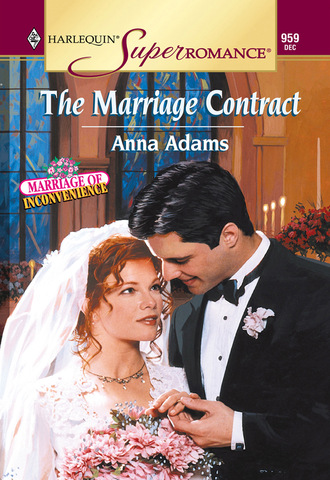
Полная версия
The Marriage Contract
Touched, Clair let down her guard. “You have nothing to make up. I’ve made my own decisions for a long time.” She grimaced, remembering some of them, a love affair with a professor that had, however unfairly, ended her college career, the jobs and towns she’d left because she hadn’t belonged. She could have made herself a home in any one of those places. “I’d like to stay, but I’d have to find a job and I’d have to face the fact that I’ll never live in my house again.”
“Do you love The Oaks more than the town? People who care about you, people who hold your history in their memories live in Fairlove, and we want you back now that it’s safe for you.”
Clair wanted to believe. “I’m not sure I can stay when I’m afraid I’d be letting Mom and Dad down if I don’t try to get the house back.”
“I’ll ask Paul Sayers to come over. You just talk to him. You don’t have to decide now.”
Agreeing to meet him meant she’d made a decision. Clair knew herself well enough to realize she’d accept a job if the landscaper offered it. She wanted to be sure before she took action, but she heard herself answering, “I’ll call him if you’ll give me the number.”
Mrs. Franklin pursed her lips. “Let me do this one thing for you, and then I’ll lay off.” She clapped her hands together. “Now, do you want the continental breakfast, or can I make you bacon and eggs and home fries like your mama used to make?”
Clair set the menu aside, hungry after such an exhausting morning. “No contest. I’ll take the bacon and eggs, thank you.”
Mrs. Franklin turned smartly for the kitchen and Clair opened the paper. A man and woman came into the dining room so completely engrossed in each other she couldn’t help watching them. She envied the couple their intimacy.
As they took the corner table, she tried to return her attention to the newspaper. The dry cleaners had an advertisement that promised they’d clean six shirts for a low, low price. So Nick Dylan had found himself a bargain.
“All right, I talked to Paul.”
Clair jumped. “I didn’t see you come back, Mrs. Franklin.”
She set a plate on the mat in front of Clair. “Better start on this. Paul’s coming over. He had some free time, and he said he wanted to talk to an experienced worker.”
Clair felt a bit nauseous, but she picked up her fork. “This is a huge decision. I still think I should take some time to make it.”
“Talk to Paul. Then think.” Mrs. Franklin straightened the knife at Clair’s right hand. Her gaze made Clair uncomfortable. “You look so much like your mother.”
“I think you’ve confused me with her. That’s why you’re so glad to see me.”
“Maybe partly. I’m ashamed I couldn’t do more for you, but maybe I want to know you better, too. And you have a right to live in the town where you were born. Fairlove can be a good place to live.”
“If your name isn’t Atherton and you don’t attract the hatred of a Dylan.”
“Jeff Dylan loved your mother once.”
“Then he hated her, and he hated my father and me.”
“I don’t think Nick Dylan is like his father. If you can stand seeing him around town, you’ll like living here again. Leota stays up at the house. She hardly ever comes down to town, and she won’t have anything to do with the likes of you or me.”
“You?” Clair was surprised. “You’re a judge’s wife. You’re just the kind of people Leota Dylan liked.”
“She likes most judges’ wives.” Mrs. Franklin turned away, and this time she was clearly hiding her thoughts. “We’ll talk about Leota later. My other guests will think I’m ignoring them.”
Clair welcomed time on her own to put her meeting with Nick Dylan behind her and think about her impromptu interview with Paul Sayers. About whether she should even consider talking to this man about a job in a town where Nick Dylan looked at her as if she’d risen from the dead.
Her breakfast went untouched as she stared at the newspaper whose ink she’d smeared, but not read. Did she have enough courage to try to make a life in Fairlove?
“Excuse me. Are you Clair Atherton?”
She looked up. A tall man towered over her table, his jeans clean but stained, his belly a gentle protrusion above his wide leather belt. He pried a Braves baseball cap off wild brown curls sprinkled with gray and threaded his fingers through them.
“You must be Paul Sayers.”
He nodded. “Selina tells me you have experience and you might be looking for work. I could use another pair of hands.”
Folding the paper away, Clair pointed at the other chair. “Do you want to sit down?”
He sat and hitched his chair closer. “Do you have any references? I know you won’t have them on you now, but you can bring them to me.”
She nodded. “I worked for a nursery in Connecticut for about two years, and then I moved on to a couple of landscaping firms in Boston.” She reached into her purse and pulled out a notepad. “I can write down names and numbers right now.”
As she wrote, he said, “I’ll take them, but first I need to know how long you think you’ll be staying in town.” He reached for a cup from the next table and poured himself coffee. “Not that I should ask, but I’ve had a hard time keeping people for longer than a season.”
She hesitated for a long moment. He was asking for a commitment. And it scared her, but this was a commitment she suspected she’d been running to, not one she would run from.
“I’ve come home,” she finally said. Paul Sayers didn’t know her, didn’t know her family. She didn’t have to prove she belonged in Fairlove to him. “I lived here once.”
“Good. Wait a minute. Atherton? Your family owned that old house in the oak grove at the bottom of the Dylan estate?”
She nodded.
“I hate seeing folks let a fine old place like that go. It’s a beauty, or it could be if someone with a little elbow grease took it over. Do you plan to buy it back?”
She looked away, not wanting to show him how much the loss of her home hurt. “I’d need more than one job to manage that.”
Paul nodded. “I sure can’t pay you that kind of money, but the company’s young. If your references pan out and you’re a strong worker and you actually stay, you’d be helping me stake my business in this town. If the business grows, my employees grow with it.”
“I don’t have a degree.”
At his crooked smile, Clair wished she hadn’t felt quite so compelled to be honest. Her embarrassment amused him.
“Mine’s over twenty years old,” he said. “Thanks for telling me, but I’m happy to teach anyone who stays. I figure I’m grooming people who’ll take ownership in my business.” He picked up his coffee cup and sipped. “Do you think Selina would bring some breakfast for me?”
“Probably.” His matter-of-fact attitude put Clair at ease. She freshened his coffee cup from the carafe. “How often does she arrange job interviews for her guests?”
“Not very.” Paul took a sip before he said, “Between the two of them, I guess the Franklins know most of what goes on in this town. If you work out, I may consider paying her a recruiting fee. Why don’t you tell me what kinds of jobs you’ve done for those other companies?”
“I have some sketches.”
Clair drew her pad out of her backpack, and they talked work. Mrs. Franklin brought breakfast for Paul without being asked. Finally he pushed back from the table and stood.
“Why don’t you drop your résumé by my office in the morning and meet my two associates. We’ll assume you’ll start on Wednesday, and I’ll call you if I have any questions about your references.”
“Thank you.” As she stood to shake his hand, she noticed the familiar scent of mulch. “I think I saw your office on the square.”
“I took over the Tastee Cone shop.” He dragged his baseball cap over his hair and smiled crookedly. “I hear my neighbors miss the ice cream.”
Clair wondered. She’d been too young to understand nuances, such as socially acceptable businesses for the square, when she’d left. What if she had come back to a place she’d made up to comfort herself? It looked the same, but so far the people hadn’t turned out the same as she’d remembered them.
She refused to think that way. She’d decided to stay. Now she had to find out if she’d really come home.
“Mrs. Franklin thinks highly of your work, and I’m grateful you had the time to come by here.”
Paul was buttoning his jacket as Selina Franklin came through the swing door from the kitchen. “You’ll probably work with me the first few days—kind of a probation period. I want to see what skills you bring, and then I’ll pair you with other staff who complement what you know. This being winter, you know we’re mostly cleaning, preparing for the spring.” He lifted his hand to Mrs. Franklin. “What do I owe you?”
“Not a thing. I’m glad you had a free hour. Did you and Clair finish your business?”
“To our mutual benefit, I hope. Thanks for everything, Selina. I’ll see you Wednesday, Clair.”
He left, and Clair turned awkwardly to her hostess. “I’d like to hug you, Mrs. Franklin, but I remember my mother telling me to keep my muddy hands off your dress.”
“You always did like growing things, didn’t you?” She dropped her arm across Clair’s shoulders and squeezed. “What do you say you call me Selina, and I’ll tell you what I propose for your living arrangements.”
“What do you mean?”
“Sit down. I’ll join you in a cup of coffee. We’re not too busy right now.”
“Mrs. Franklin, I can’t let you do anything more for me.”
“Selina. And I want you to do a few things for me. When we finish our talk, I’ll show you my back garden. It’s a jungle.”
Clair stared in dismay at the third cup of caffeine Selina had poured for her. “That lovely garden?” she said. “I used to think it was a playground.”
“It looked like one. The judge had more time to work with it back then, but his taste ran to the gauche.” Selina crossed her legs. “And I’m being generous. Since he took office, I’ve hauled away the candy-striped poles. I took down the birds and the wires he used to make them look like they were flying. I even got rid of that horrible birdbath sculpture his mother insisted we keep in front of her window. You remember the Furies in stone? They were most indecent—looked like snake women writhing all over each other, but then, you know the judge had to get his taste from somewhere.”
“Are you asking me to work on your garden?” Excited, Clair forgot her caffeine buzz and sipped the coffee. “I’d love to, but like Paul said, I can’t do much more than clean and plant bulbs for the spring.”
“Cleaning.” Selina sighed in overstated relief. “Just what I need back there. You do what you can after your work with Paul, and I’ll give you a room until you find a place to live.”
“I’m not going to pretend I don’t want to.” A garden she’d loved as a child proved irresistible. “You have a deal.”
“Great. Take today to rest. You can start tomorrow.”
“Thanks.” She set her napkin on the table and broached an uncomfortable subject. “Can I ask you one more favor, Selina?”
“Ask away. I’ll do what I can.”
“I appreciate your help, but I remember how this town works. Please don’t make me some sort of a…community project. I’d like to start fresh.”
“Don’t worry. I haven’t told anyone else I had any part in bringing you back here. As far as they’ll know, you decided to come home.”
“They? I don’t think I want to know who else was in on your plan all these years.”
Selina’s mouth quivered, but she wound her arms around Clair. “You’re going to be all right now.”
Clair hugged her back. Maybe coming home really was the right decision.
Clair unpacked the rest of the things from her car and then checked Selina’s gardening shed for tools. She made a list of things she’d need and slipped it into the pocket of her jeans to take to Bigelow’s General Store.
As she shopped the garden section at Bigelow’s, she found herself circling flats of pansies. Her mom’s crocuses had heralded the end of winter every spring. In fall, she’d planted pansies in her favorite flower bed by the front door.
Clair wanted to go home and tell her parents about today, that she’d met Nick Dylan and survived, that she’d found a way to stay in Fairlove if she got the job with Paul Sayers.
Maybe she couldn’t tell them in spoken words. Maybe she hadn’t been able to force herself to look inside the house, but she could do something about the way the outside looked. Purple had been her mom’s favorite, so Clair added purple pansies and soil nutrients to her purchases.
She parked at the end of the driveway again, got out and followed the path she’d made earlier, marked by the bent grass.
Taking tools, plants and bucket up to the house required a couple of trips, but contentment stole over her. She forgot about time as she pulled weeds and restacked the bricks that had fallen away from the retaining wall in a dry puddle of crumbled mortar.
She hummed to herself while she blended the nutrients into the black earth. She ought to leave this flower bed for another day or two, but she couldn’t. One of the Dylan attorneys might turn up at Selina’s and tell her to stay off Dylan property.
She planted the pansies, then brought water from the stream that ran behind the house to thoroughly moisten the bed. At last she stood back to admire her work.
The sad, chipped house paint nagged at her, but the past twelve years had taught her not to dwell on what she couldn’t change. Her pansies gave The Oaks an air of hope again. She felt foolish about being too afraid to look inside earlier.
Clair marched around the house to the kitchen window and scrubbed at the glass until she could make out the white enamel sink. Because dirt filmed the other side of the window, too, she still couldn’t see anything in the shadows.
“Clair?”
She recognized his voice. Slowly, she turned and found he’d taken control of his emotions, and he’d inherited the Dylan ability to gaze arrogantly at the rest of the world as if he understood its relation to him. Patience stalked behind his gaze. He could wait for what he wanted.
Would this Dylan know how to grind the family ax against her?
“I’m surprised to find you here,” he said.
“Surprised I’d trespass?” He gestured at the house. “Seeing this place has to hurt you.”
Ashamed of the way she’d fled without looking back earlier, she put on some arrogance of her own. “It looks better now, with the pansies. They’re trespassing, too.”
“How much have you missed this house?” His unexpected question suggested he’d stumbled upon the solution to a mystery.
Uneasily, she headed back to the front of the house to collect her tools. “I’ve missed it enough that I won’t promise not to trespass again.”
“I didn’t ask you not to come here.” His voice came from close behind her.
His changed mood signaled a shift in the balance of power between them. She picked up her things in one armload for the return trip to her car. Nick stood behind her again when she turned. He nodded toward the house.
“Do you want to go inside?”
Her breath caught. She wanted to go in. More than anything. But he was Nick Dylan. The son of the man who’d taken hearth and home from her. She couldn’t make herself beholden to him.
“I have to leave.” Immediately, she cursed her foolishness. He was the one person who could let her into her old home. She turned back. “Maybe some other time, I could come to your office and pick up the key?”
“You know where I work?” He seemed surprised that she would have talked to anyone about him.
“It’s a small town.”
“Come to my office. I’ll have the key for you.”
She held back, feeling suddenly vulnerable. To think she would walk into her house again, touch the walls and floors her mother and father had loved, dispel her nagging sense of having dreamed her first fourteen years.
But how much of Nicholas Seton Dylan’s character rose out of his father’s gene pool? He must have ulterior motives.
She forced herself to take measured steps back to her car. In case he was watching her as his father had watched her mother…
CHAPTER THREE
CLAIR HAD BEEN WORKING with Paul every day for a week when she stood at his shoulder as he tossed a quarter into the air.
“Heads, you aerate, tails, I go across the street and try to sell our services to Mrs. Velasco,” he said.
Clair clamped her hand around one of the aerator’s handles. “You think I don’t notice you’re sticking me with this bone-shaker either way?” She turned it toward the front of the lawn. “How do you know Mrs. Velasco’s name?”
“I read her mailbox.” Paul’s sheepish grin was infectious. Friendly and open, he lacked Nick Dylan’s intensity. He shrugged. “I can’t afford mailing lists, but she’ll see you over here, giving me your all, and she’ll beg us to help her.”
“Giving you my what?” Clair asked.
“Your all to make a more beautiful lawn for her neighbors.”
At his prim spiel, Clair had to smile. “I guess her leaves need mulching.”
“I’ll promise her the industrious young lady across the street will do the job.”
He moseyed over, and Clair fired up the aerator. At the end of her first row across the lawn she peeked at her employer in his salesman persona.
“Mrs. Velasco” turned out to be a man of dignified years. His white hair floated in the cool breeze. He looked frail enough to rustle like the leaves that glided across his yard. He lifted a hand to Clair, joining Paul in a wave. She waved back, but then latched onto the aerator before it took off without her.
Its tendency to act independently forced her to keep her mind on her task, but when she finished, she turned to find Paul leaning against his truck, his feet crossed at the ankles. Silence echoed in her ears after the aerator’s roar. She worked her way around Paul to hoist the equipment back onto the trailer.
“What do you think?” she asked.
“You’re a strong woman. You remind me of my wife before she told me she couldn’t work with me anymore.”
“Thanks.” She tied the machine down with safety straps, guessing she could offer insight into Mrs. Sayers’s reasoning. “But what I meant was, am I safe to work on my own, or are you afraid I’ll single-handedly bring down the Fairlove Lovelies empire if you turn your back on me?”
“Every time you say our name I think you’re making fun of my business.” Paul jabbed at her forearm. “Don’t mock the company that feeds you.”
“Have you decided it’s going to feed me?”
“You have some real authority issues, Clair, but you work hard.” He held out his hand. “Congratulations. You’re official. Probation’s over.”
“Thank you.” She shook his hand and walked around him again to open the passenger door. “I can use the paycheck.”
“How do you feel about Mr. Velasco?”
“You promised me to him?” Paul didn’t care whose soul he sold to lock down new work.
“You closed the deal when you tossed that branch. No man can resist a woman who can whip him in a wrestling match.”
“Get in the truck, Paul.”
“Could you come back and work up a design for him?”
She let honesty get in the way of her ambition again. “I’d work like crazy at it, but remember, I’m not professionally trained to draft a plan.”
“I don’t care about this college degree that seems to be sticking in your craw. Can you do the work?”
His confidence pleased her. “You bet I can. Will you go over it with me before I show it to Mr. Velasco?”
Instead of answering, Paul took a tape measure from his pocket. “I told him we’d look over the yard before we left. He’s especially interested in reclaiming the back from nature.”
Clair fell into step beside Paul. “I’d better warn you, I tend to be on nature’s side.”
“I figured that out already.”
She enjoyed working with him. He’d quickly sized up her skills, and she’d learned from him during her probation period. They thought alike, and their working association had quickly become a friendship Clair valued. That afternoon, when they returned to the office, the others had gone home for the day. Clair took over Paul’s drawing table and lost herself in her work.
BY PLANTING FLOWERS in her old yard, Clair had shown Nick a way out of his problems. Maybe he could offer her what she wanted and persuade her to help him. He’d just have to make her forget who he was. For a year.
He’d hired a detective to find out where and how she’d spent the past twelve years. Two weeks later, he’d come home from his volunteer shift at the Staunton clinic and found the detective’s report in his mail.
The number of foster homes she’d gone through surprised him, and they’d all been in the suburbs outside Washington, D.C. How had she felt, living within a couple of hours of the town she’d left after her parents died?
After high school, Clair had won a scholarship to Wellesley, which she lost after the first year. The detective reported rumors of an affair with one of her professors. Nick dropped the report, frowning at the list of jobs she’d held before she settled down to work at landscaping.
She’d been troubled. Maybe she still was. Even if she wasn’t still changing jobs, she’d left her home in New England to make her way back here. How stable was she?
The detective reported she’d known several men besides the professor. Nick assumed the “known” was a euphemism. He tightened his mouth. Had she tried to replace the love she’d lost because of his father’s need to hurt a former lover?
He’d like to know more about how Clair’s father had lost their house. He hardly remembered David Atherton. Older than Sylvie by more than twenty years, his very existence had been an insult to Jeff Dylan. Jeff saw him as a less-virile man who’d stolen the one woman Jeff truly loved. Jeff liked to forget he’d told Sylvie she wasn’t good enough to marry.
After she’d moved on, Jeff’s second thoughts had nearly destroyed two families. Jeff had searched for revenge against David and Sylvie, who’d truly loved each other, until he wound up with the Atherton mortgage. And then he’d foreclosed.
Twenty at the time, preoccupied with premed, Nick had never asked for details. To Nick, Jeff’s anger at the woman he’d thrown away had been an insult to Leota and an emotional counterbalance to Jeff’s disappointment with the son he’d fathered on the rebound.
Clair had found the healthier response—contempt for his father’s “love.” But the past still held her as tightly as it did Nick. Like sought like when pain struck this deep, and he’d recognized how hurt she must still feel.
He pictured her, lithe muscles straining as she’d planted those flowers at her house. Humming a song as she reclaimed a small piece of her past.
Maybe he was crazy, but he thought Clair might be the perfect wife. She certainly wouldn’t want the position permanently, but she longed for the house only he could give her.
At a knock on his door he shoved the letter, report and envelope into a drawer before he opened the door to Hunter.
“Dr. Dylan, I’m just on my way to tell Mrs. Dylan dinner is ready. I was concerned you might forget to come down again.”
Nick felt a surge of warmth for the man who still treated him as the neglected child in a rich man’s house. “Making sure I eat isn’t your job.” Gratitude roughened his voice.
“I’m concerned about your mother, as well.” Hunter shrugged uneasily and pointed at the door. “May I come in?”
Nick stood aside. Frightened for Leota, he’d flushed the pills, poured out the brandy and told his mother he’d invite a therapist to live with them if she renewed her supplies. “What else has happened?”
“I don’t know whether I should talk to you about Mrs. Dylan. Telling you what I think is going on with her might be inappropriate, but you know my loyalty.”
“What is wrong, Hunter?”
“She stays in her rooms until lunch. She’s never hungry. I find this most difficult to say, but her maid suspects she’s begun to cry herself to sleep at night. Mrs. Dylan’s pillowcase is still damp when she makes the bed.”














